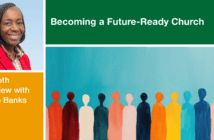“My house shall be called a house of prayer for all peoples,” says the LORD through the prophet Isaiah (56:7). What could this possibly mean for us today, in our highly fragmented society?
I am a parish pastor, and my passion for hospitality comes out of a deep love for the church and a strong desire to see congregations become more welcoming. I truly believe that embracing all people is the will of God and that we show faithfulness when we move ever closer to that goal. I believe that hospitality is the key to becoming an uncommon Christian community, one that embraces all people with God’s love and grace. The need is greater now than ever, since all of us are living in a highly polarized society. I am convinced that God wants — and the world needs — churches that are truly welcoming.
God wants us to be an uncommon community, one that is truly countercultural in our shattered society — “a house of prayer for all peoples” (Isaiah 56:7).
I serve a neighborhood church in suburban Washington, D.C., a congregation with many of the same strengths and weaknesses as thousands of other churches. Chartered in 1954, Fairfax Presbyterian Church (FPC) began its life as a booming, traditional, middle-of-the-road church that served as a meeting ground for a large, ideologically diverse community of believers who may not have agreed on politics, but who identified themselves with a particular religious tradition and proudly wore the label “Presbyterian.” But over the years FPC has lost members left and right to more specialized, politically focused congregations. Our story echoes a broader, troubling change in mainline Protestant denominations.
The United States is growing increasingly diverse with projections that minorities will be in the majority by the year 2050. Most say they like to live in diverse communities, and about two in three claim they prefer to live close to people belonging to different races, religions, and income groups. That’s what people say. But the truth is very different. It is much more common for people to cluster together in “life-style communities” among those who are just like themselves — especially those who share their political affiliation.
This trend toward a fractured and polarized community is the exact opposite of the challenge God lays before us in the book of Isaiah. The Lord does not want us to be a common community, one in which Republicans worship with Republicans, Democrats pray with Democrats. Instead, God wants us to be an uncommon community, one that is truly countercultural in our shattered society — “a house of prayer for all peoples” (Isaiah 56:7).
So from where does this unusual vision come? Before the time of Isaiah, the people of Israel were considered to be God’s chosen ones; and the purity code of Deuteronomy excluded particular categories of people. In short, the common community that existed in Israel was made up of like-minded Israelites — it was a comfortable congregation of people who shared the same ideas of what was pure and what was not. But then God came along with a new vision of community, one in which all people who honor the Lord in their actions are to be included.
What a radical shift this was. Suddenly, the community of faith was not limited to people of the same nationality or political party. Through the prophet Isaiah, God called for barriers to fall in the religious community; and this began a movement of inclusiveness that only accelerated when Jesus began his gracious and loving ministry. Throughout the gospels, we see Jesus eating with tax collectors and sinners, welcoming children, talking with women, and healing those considered unclean and estranged from the community of faith. Jesus practiced a ministry of hospitality that truly welcomed strangers into the community.
That form of hospitality is far more nourishing than cookies and coffee after Sunday morning worship. Unfortunately, it is not practiced very well by churches today, despite the desire of many congregations to be welcoming. At FPC we have worked to expand the vision of our congregation as “An Uncommon Christian Community, embracing all people with God’s love and grace.” We have sought to improve our practices of hospitality so that strangers will be welcomed into a place of acceptance, included in a network of relationships, and given time and resources to grow in their faith. We want FPC to become a true meeting ground, where people of diverse perspectives may gather, worship, talk, and debate. As Christians, we understand Jesus Christ to be the meeting ground between God and humanity.
Theologically, we want FPC to be solid at the center, and grounded in the God who comes to us as the Holy Trinity. But we also desire that it be soft at the edges, with a commitment to embracing all people with God’s love and grace. Solid at the center and soft at the edges — that is the consistency of an uncommon Christian community. Our success will depend on becoming an ever more hospitable place, one that finds effective ways to reach across differences and practice God’s welcome.
I am convinced that openness to growth and change has to be part of any welcoming congregation, as it follows the example of Holy Scripture and the leading of the Holy Spirit. After all, Isaiah was a reformer, as was Jesus — both reached across differences, practiced God’s welcome, and made the world a more just and loving place.
This article is adapted from his new book, The Welcoming Congregation: Roots and Fruits of Christian Hospitality (Westminster John Knox Press, 2012), and used with the publisher’s permission. It is available at The Thoughtful Christian and Amazon.
Related Resources:






